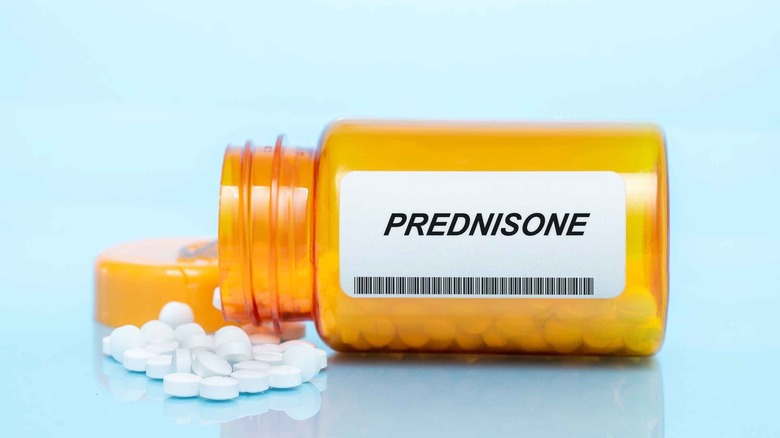How Prednisone May Affect Your Diet During Course Of Treatment
Prednisone is a corticosteroid used to relieve inflammation and allergic reactions (via Mayo Clinic). According to a 2011 study published in the American Journal of Physiology-Endocrinology and Metabolism, corticosteroids come in two types: glucocorticoids and mineralocorticoids. DrugBank Online defines prednisone as a synthetic glucocorticoid obtained from cortisone, which was approved by the FDA in 1955. Since then, statistics from ClinCalc show that over 9 million people in the United States have used it.
Corticosteroids, also known as steroids, mimic the hormone produced by the two adrenalin glands found above the kidneys, per the National Health Service (NHS). When taken in doses higher than the body produces, steroids can help reduce inflammatory conditions, like asthma and eczema. They help reverse increased capillary permeability and suppress the migration of polymorphonuclear leukocytes, as per a 2022 study published in the journal StatPearls. Beyond inflammation, prednisone's immunosuppressive nature helps treat various symptoms, including redness, itching, and allergic reactions.
Despite the many benefits, prednisone is only available via prescription, considering it's also a steroid. If you're taking it for the first time, it's important to understand the side effects, interactions, and how it might interfere with your diet.
How prednisone affects your diet
As with most drugs, prednisone comes with various side effects. It can affect how essential minerals and vitamins are inhibited and utilized by the body, according to WebMD. Some minerals are a mainstay in your body's functionality. For example, calcium helps maintain strong bones and teeth and plays an important role in blood clotting, muscle contraction, and nerve functions (via Harvard T.H. Chan). According to a 1995 study published in the journal Clinical Rheumatology, taking prednisone can increase serum calcium. However, excessive calcium in the blood can weaken your bones, cause heart disorders, and create kidney stones (via Mayo Clinic).
Prednisone also reduces the amount of protein in your blood (per National Kidney Foundation). A diet rich in protein can help your body build muscles, hormones, and enzymes (via Healthline). If protein is in short supply, your body might seek it from elsewhere, most likely from skeletal muscles, to protect tissues and various body functions.
Although mostly seen with higher doses, weight gain is yet another side effect that can come with long-term prednisone use. In fact, as per a 2006 study published in the journal Arthritis Care & Research, 70% of people who took glucocorticoid, the class of drugs to which prednisone belongs, noticed weight gain. However, unintentional weight loss is also a recorded side effect of steroid-induced diabetes (per Medical News Today). Steroids, like prednisone, can increase blood sugar levels, making the liver resistant to insulin.
How to prevent weight gain when taking prednisone
It's always best to consult your doctor before making any major dietary changes. As a guide, the University of California San Francisco advises eating a diet low in sodium, which is no more than 2,000 mg to counter the effects of fluid retention caused by prednisone intake. Potassium-rich foods can also be a great addition to your diet. Eating high-potassium foods, like bananas, avocados, and tomatoes, helps your body maintain a healthy fluid balance, as the mineral increases urine production (via Healthline).
As noted earlier, prednisone can also spike blood sugar levels, a claim which is reiterated by the National Kidney Foundation. Keep in mind, reducing sugar intake and monitoring your weight is vital when on prednisone. This means consuming refined sugars, like concentrated sweets, might do more harm than good. It's best to opt for fresh fruits and vegetables and limit cholesterol and saturated fat, per the University of California San Francisco. If the weight gain is becoming too hard to handle, consult with your doctor before attempting to stop prednisone.



